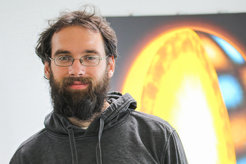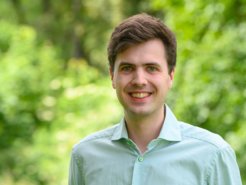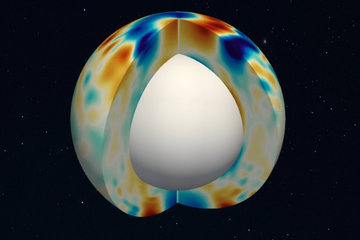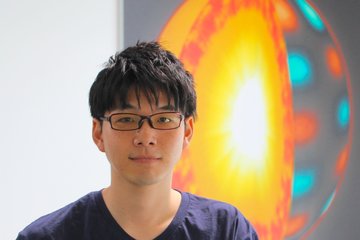Top achievements honored
Two young researchers from Göttingen receive the Otto Hahn Medal from the Max Planck Society.
Björn Müller, researcher at the MPI for Solar System Research, and Cai Dieball, scientist at the Max Planck Institute (MPI) for Multidisciplinary Sciences, and have been awarded the Otto Hahn Medal for outstanding achievements in their dissertations. The Max Planck Society (MPS) presented the awards at its annual meeting on June 25 in Magdeburg.
A look inside the Sun

The Sun is a capricious star: during periods of high activity, it resembles fireworks, repeatedly hurling enormous amounts of radiation and particles into space in violent eruptions. During periods of low activity, it calms down. This changeable behavior is caused by powerful plasma currents flowing inside the Sun. They cannot be observed directly. However, using helioseismology methods, it is possible to infer the plasma movements inside the Sun from the oscillations that appear on its surface. Numerous space probes and solar telescopes on Earth provide the necessary observational data.
Traditional helioseismology methods do not fully exploit the potential of this data, but only process part of the information it contains. In his doctoral thesis, Björn Müller from MPS developed the theoretical foundations for a new helioseismological method called iterative helioseismic holography. The method places extremely high demands on computing power and storage capacity, but utilizes all the information contained in helioseismic observational data. As the Otto Hahn Prize winner was able to demonstrate, this provides a much more accurate “view” beneath the surface of the Sun: iterative helioseismic holography has the potential to image processes inside the Sun with significantly higher spatial resolution than previously possible. In the future, this could make it possible, for example, to visualize the slight asymmetry of plasma flows in the northern and southern hemispheres of the Sun and understand their effects on the Sun’s behavior.
Björn Müller studied physics and mathematics at the University of Göttingen. Already in his bachelor's thesis, he dealt with the numerical treatment of inverse problems in the field of solar physics. In 2020, he completed his master's degree with a research thesis on galactic nuclei. His dissertation, which he completed over the following three years at the Max Planck Institute for Solar System Research (MPS) in the department “The Interior of the Sun and Stars,” brought him back to the Sun as well as to the theory and numerics of inverse problems. He was supervised by Laurent Gizon, Managing Director of the MPS and Professor at the Institute for Astrophysics and Geophysics at the University of Göttingen, and by Thorsten Hohage, Professor at the Institute for Numerical and Applied Mathematics at the University of Göttingen and Max Planck Fellow. The doctoral studies were completed as part of the International Max Planck Research School for Solar System Research at the University of Göttingen. Björn Müller has been conducting postdoctoral research at the MPS since 2023. Using the newly developed method of iterative helioseismic holography, he is currently analyzing observational data from NASA’s Solar Dynamics Observatory.
Stochastic dynamics in small systems

Atoms and molecules are continuously in thermal motion in their microscopic world. As a result, small biophysical systems, such as molecular machines, are subject to random dynamics.
In his doctoral thesis, Cai Dieball investigated the properties of these random dynamics along individual motion paths, known as trajectories, from the perspective of mathematical physics. He focused on the mathematical concept of stochastic analysis, a tool for modeling random processes that allows the description of changing trajectories. This approach yields new insights into certain physical quantities, such as local densities and currents. Additionally, Dieball gained insights into the thermodynamic “cost” – such as heat dissipation – that is caused by the precision of molecular machines and active processes. Furthermore, Dieball investigated an asymmetry between cooling and heating far from thermal equilibrium.
Cai Dieball studied mathematics and physics at the University of Göttingen and applied mathematics and theoretical physics at the University of Cambridge (United Kingdom). He then completed his doctorate in the Mathematical bioPhysics research group led by Aljaž Godec at the MPI for Multidisciplinary Sciences. In 2023, he completed his doctorate, for which he was awarded the Born Franck Dissertation Award by the Faculty of Physics of Göttingen University. Dieball is currently continuing his research in the group as a postdoctoral researcher and planning his next steps in science.
About the Otto Hahn Medal
Since 1978, the MPS has awarded the Otto Hahn Medal annually to young researchers for exceptional scientific achievements and outstanding doctoral theses. The prize is endowed with 7,500 euros.













